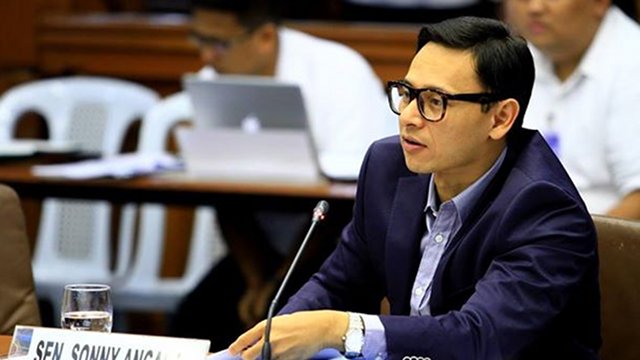SUMMARY
This is AI generated summarization, which may have errors. For context, always refer to the full article.

MANILA, Philippines – Instead of just focusing on redefining government savings, why not revisit old budgetary laws and institutionalize reforms?
Senator Juan Edgardo “Sonny” Angara weighed in on the debate of whether or not Congress should redefine the term “savings” after the Supreme Court struck down key acts under the administration’s spending program.
Angara had an alternative proposal: a comprehensive review of laws related to the budget including revisiting decades-old laws, and incorporating “best practices” in public sector budgeting as well as technological advancements.
“There has to be a general framework,” Angara told Rappler on Monday, August 4. “What is the balance of power between the executive and the legislative, between the people and their representatives?”
Angara said it is important to conduct the review now following the controversy over the administration spending program. “People will eventually forget this. No one will want to study these things because it’s so technical. At least now, people are interested.”
In a statement, he pointed out that the two main laws guiding budgeting were created “when desktop computers were still alien in the bureaucracy.”
A lawyer, the senator said instead of what he called “piecemeal amendments” to budget laws, Congress should review the Presidential Decree 1177 that the late dictator Ferdinand Marcos issued in 1977 – 37 years ago.
He also wants lawmakers to look into the Administrative Code of 1987 under the Cory Aquino administration, which President Benigno Aquino III used to defend the legality of the executive branch’s use of savings under the Disbursement Acceleration Program (DAP).
The high court declared key practices under DAP unconstitutional, saying this violated the separation of powers among the 3 branches of government and undermined Congress’ power of the purse. One of the acts it struck down was declaring withdrawn unobligated allotments and unreleased appropriations as savings before the end of the fiscal year.
In response, President Aquino asked Congress to pass a joint resolution to redefine “savings” to give the executive flexibility in budget execution.
Angara first cited the need to revisit the two laws during a Senate hearing into the DAP two weeks ago. Now, he elaborated on the need to review them, calling these “mere executive issuances.”
“In 1977, PD1177 was done, there was no legislative. So who was the President controlling? He was controlling his own budget secretary. Now we have a different system of government. How do we make the budget more transparent and more responsive?”
Laws need updating
Angara said that current laws governing the budget are no longer responsive to modern technology and realities.
“For example, in 1987 when the present Administrative Code took effect, the national budget was P121 billion. It has grown 21-fold since. For next year, the proposed budget is P2.6 trillion,” Angara said.
“There was no e-budgeting and paperless transactions then. Budget issuances then were sent through snail mail. Unlike now, we have e-mail and even Twitter. It won’t hurt if new technologies would be supported by a new legal infrastructure,” he said.
The senator added that the Supreme Court decisions on DAP and the congressional pork barrel or the Priority Development Assistance Fund (PDAF) “might also require some corresponding adjustments in law.”
“What happens if we have a president who wants to abuse public coffers?” he said.
Use savings to reduce deficit
For Senator Ralph Recto, former socio-economic planning secretary, savings should instead be used to reduce the budget deficit.
The senator said he will raise this in the deliberations for the 2015 budget.
“Why do we need to spend if the budget is not properly prepared? Why should we leave it only to one branch of government to determine? I think it will improve the ability of government to plan its expenditure, make a budget and that will help reduce poverty if the budget was prepared better.”
Recto pointed out that debt still accounts for less than 60% of the GDP.
“You do not have a balanced budget. Now is the time to reduce it. Then you have better macro-economic stability. Interest rates are on the rise. America is withdrawing on quantitative easing. So I will adopt a conservative view on savings. Or if the savings are really big, why not have a tax cut? Return it to the people that’s why it’s savings.”
Lawmakers remain divided on whether or not Congress should heed the President’s call to redefine “savings” after the Supreme Court ruling.
Senate finance committee chairman Francis Escudero said last week that the fate of the resolution depends on what definition of savings Congress decides to use. He also sought to correct misconception of the court ruling on savings.
“It’s not that clear. The Supreme Court said that given the current definition of savings in the budget, you cannot generate savings until the end of the year. They did not say it was unconstitutional to use the savings within the year. They said that within the existing definition of savings in law, you cannot use it within the year,” he said.
“You can use savings but there has to be [an item in the] budget to supplement or augment. We can’t pass a law saying government can violate that constitutional provision,” Escudero added.
A staunch Aquino ally, Senate President Franklin Drilon is in favor of Congress redefining savings but Senate Majority Leader Alan Peter Cayetano said it will be best to allow the court to clarify its decision so lawmakers will not be accused of circumventing the ruling.
Opposition lawmakers also warned against violating the court ruling in redefining savings, saying the tribunal might end up striking down the joint resolution as well. – Rappler.com
Add a comment
How does this make you feel?
There are no comments yet. Add your comment to start the conversation.